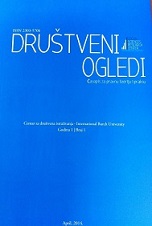Neriješena ustavna pitanja u svjetlu kontraverzi i neslaganja o državnom uređenju i fiskalnom sistemu Bosne i Hercegovine
Unresolved constitutional issues in the controversy and disagreement on the state organisation and on the fiscal system of Bosnia and Herzegovina
Author(s): Kadrija Hodžić, Izudin HasanovićSubject(s): Law, Constitution, Jurisprudence
Published by: Centar za društvena istraživanja
Keywords: Dayton; National Political Kidding; Fiscal Sovereignty; Fiscal Confederalism
Summary/Abstract: Institutional (in) ability of the Dayton agreement to integrate conflicting national community politically and ideologically in a democratic community, caused different and often conflicting opinions on "the spirit of Dayton" and the consequences of such a regulation on the viability of the Bosnian society and the state of Bosnia and Herzegovina itself. The authors elaborate such disagreements on the system of government on the theoretical, legal and political level, on one hand. On the other hand, the authors give arguments that the thesis that the constitutional order of BiH ignores its financial sovereignty concluding that Bosnia and Herzegovina is financialy sovereign as one confederation could be. In the core of the legal debate on state regulation are different approaches to the allocation of responsibilities between state and entities, and to the organization of government. In this debate, the dominant question is whether Bosnia and Herzegovina is considered a federation or a confederation. In the disagreement of the national and political elite, the conflict based on ethno-national conception of ethnic homogeneity and national sovereignty over their territories, is dominant. The solution for the viability of Bosnia and Herzegovina is observed through two conceptual levels. In the first one, the involvement of the international community, especially the European Union, in designing the changes of Dayton seems inevitable. Per second one, Bosnia and Herzegovina will be left to reconcile by herself the present irreconcilable differences of their national political elites. In both cases, the minimum acceptable framework for all legal solutions should include the establishment of mechanisms for the protection of equal individual collective rights, equality of the constituent peoples in the entire national territory, including minority rights, and the adoption and implementation of international charters and conventions on human rights
Journal: Društveni ogledi
- Issue Year: 1/2013
- Issue No: 1
- Page Range: 29-55
- Page Count: 26
- Language: Bosnian

